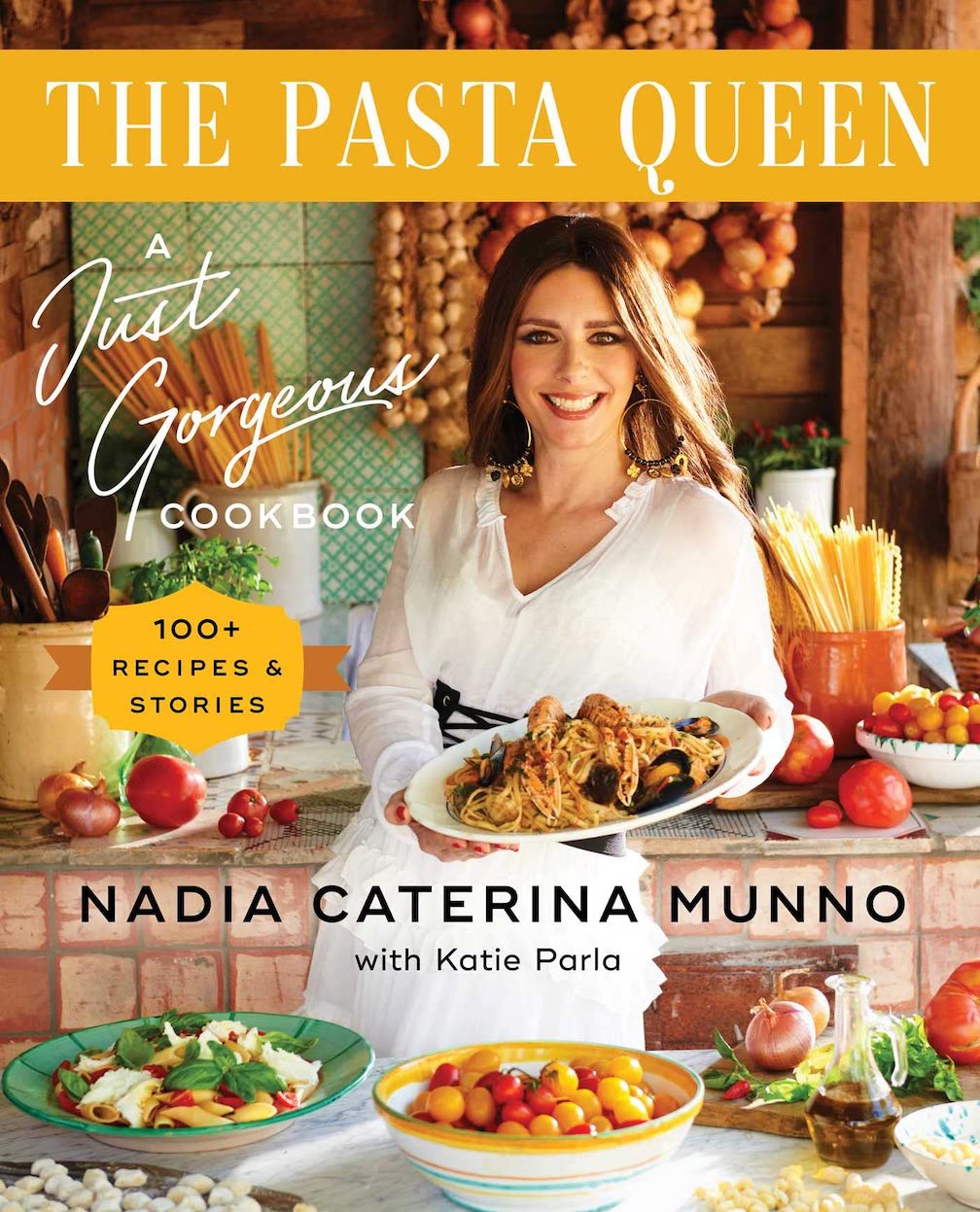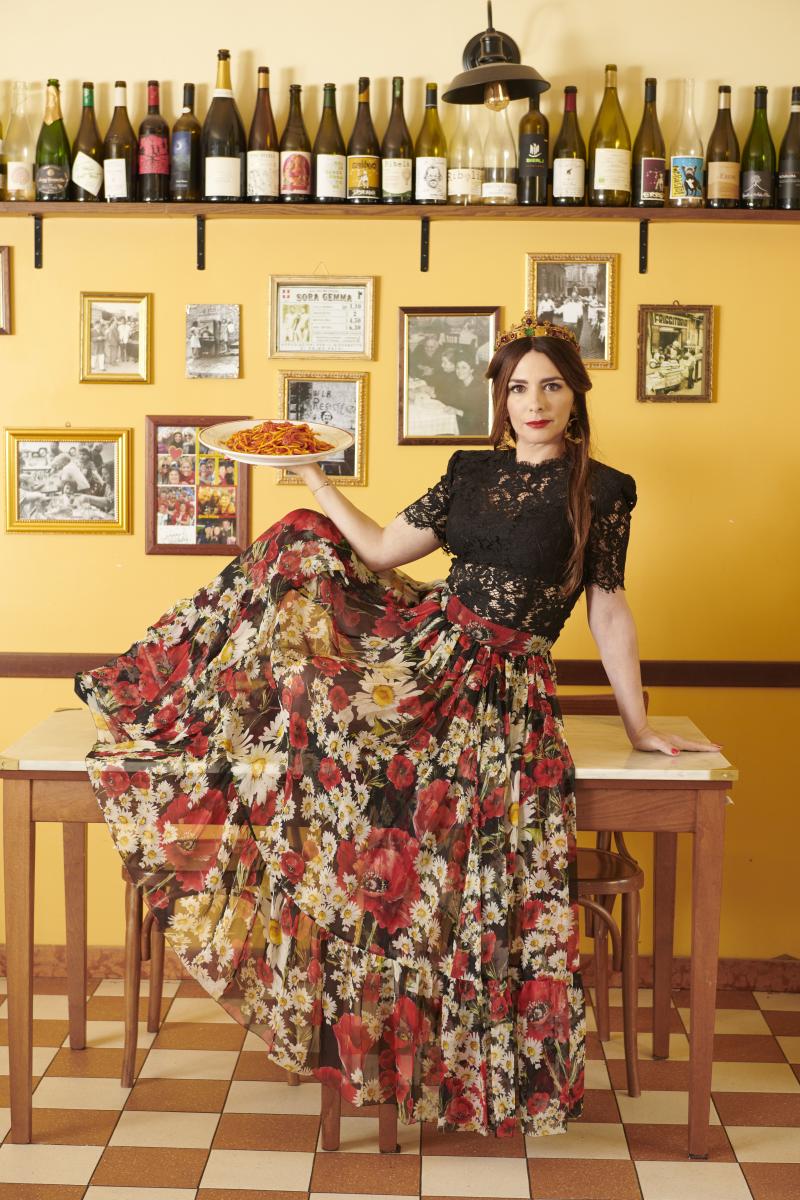Pasta preparation is a serious matter in Italy. But with the “anything-goes” approach often seen on social media, proper technique can fall through the cracks. So, what happens when one headstrong Italian woman spots a particularly blasphemous lasagna recipe on TikTok? She decides to set the record straight about how to do it the Italian way.
That was how Nadia Caterina Munno first made waves back in 2020. Today, you may know Nadia as “The Pasta Queen”: a hair-flipping, sauce-stirring Internet sensation, creator of a viral spaghetti al limone recipe, and queen of all things, well, pasta.
But before all that, Nadia’s a Roman, first and foremost. Raised between the capital and the south of Italy by a family of pasta makers, she’s from a “royal” pasta bloodline, so to speak. Nadia recalls fond memories of months spent growing up on the Italian soil, where her passion for food began, all thanks to her family and the land.

Nadia moved abroad to London before eventually settling in the United States, where she was working in marketing with her husband before pandemic pressure brought her job to a halt. Amid all the unknowns of the first few pandemic months, Nadia, like so many of us, discovered TikTok — in her case, through her kids. Having previously experimented a bit with YouTube, she’d been uninspired by that platform, but immediately took a liking to TikTok’s humanness and relatability.
Deciding to draw on her love for performance and Italian cuisine, Nadia rallied and gave the video world another shot, sharing recipes and glimpses of her life as an Italian in the United States. Today, Nadia has transformed into an Internet personality with over three million devoted followers obsessed with her contagious energy, addictive recipes, and digestible content.
I recently got to pick The Pasta Queen’s brain, hearing her take on everything from cooking for her family abroad to how to “Italianize” your home (plus, an exciting preview of her forthcoming book).
Chatting with The Pasta Queen
Gabriela Proietti: How do you typically shop for ingredients in Italy? How is it different from how you shop in the US, and where would you suggest that our US-based readers shop for high-quality ingredients?
Nadia Caterina Munno: Living in Italy, whenever you turn any corner, there’s a farmers’ market, someone selling fruits and vegetables to fish and bread. That’s how I grew up, going to the mercato and watching the farmers bring their goods from their land very early in the morning, every single day. [Coming to the US] was a difficult transition. I found it very hard to find genuine clean and fresh food until I started building relationships with my local farmers. But they’re everywhere, even here in Florida, which I couldn’t believe!
I always recommend finding local farmers that not only produce high quality food, but are overshadowed by big, multinational brands that don’t care. Build relationships with farmers in your area that care about the soil and, in return, support local businesses and families. These relationships feel like something you find in Italy.

GP: You previously had a passion for hosting dinner parties at home (Italian ones, I must add). What are some things that should always be included?
NCM: Aside from great food, music! Always music. It really sets the mood and tone for an evening. And I am not talking about “Bella Ciao,” but Italian classics from the ‘60s up to the ‘80s. Another thing is a lot of fresh flowers and greenery: I usually incorporate herbs and garnishes that I cook with and turn them into a beautiful tablescape — anything from lemons to rosemary. A good bottle of wine (or a few!) from Tuscany down to Campania is always on the table. Whatever the occasion is, I always incorporate the whole family, especially my kids. It teaches them the importance of family and hospitality.
GP: What are indispensable tools to "Italianize" your kitchen? What are tools that no one really needs?
NCM: Copper pots and pans, a recipe for perfect pasta every time. A nice serving fork to create beautifully plated pasta nests and also wooden spoons. I love using wood. A cheese grater for cheeses like parmesan or pecorino is always on hand. These cheeses are a religion for us! I don’t ever bother with my air fryer. I use my good old-fashioned oven.
GP: As “The Pasta Queen,” you're in a good position to give advice on this: What shapes of pasta should we always keep on hand?
NCM: My number one is spaghetti. It is so southern Italian and versatile; you can make it for nearly everything, and you can’t help but love twirling it with a fork. There is also my affection for maccheroni, especially the classic ziti shape that brings back a handful of fond memories from growing up, especially when paired with a chunky ragù sauce.
Something I rarely buy is farfalle, referred to as “bowties” in the United States. They're pretty but they’re not very…practical. They break and are super floppy. I could totally live without them.
GP: Is fresh pasta inherently “better” than dry pasta?
NCM: Not necessarily! Quality dry pasta has no additives. Since it’s dry, there is only water and wheat. There is also something special about the flavor of heavy durum wheat used with dry pasta; when cooking it, it comes out to be perfectly al dente. I must say, making fresh pasta is extremely therapeutic, but it is not my go-to. I am a mom and life gets busy.
GP: What are your go-to pantry staples?
NCM: Number one is good salt — I love unprocessed, unrefined salt, and always keep two shapes (coarse and fine) in the kitchen. I always say that salt makes the invisible “visible” when it comes to flavors in any dish. High quality, extra virgin olive oil directly from Italy, which you can find at a local supermarket (just read your labels), and jarred San Marzano tomatoes. I grow my own basil and you can do the same — grow a small plant to always have on hand.

GP: You have your first cookbook coming out this November called The Pasta Queen: A Just Gorgeous Cookbook. What inspired you to write the book?
NCM: The book is dedicated to the women who raised me, from my nonne to my great aunties, who taught me the importance of the family unit. I wanted the book to highlight specific recipes that had defined moments of my life, from when I was born and raised between Rome and the south of Italy to falling in love and moving abroad. I have structured the book as a sentimental journey. In every chapter, you will find a personal story or anecdote, and I have written the recipes connected to that stage of my life. It is incredibly unique and special.
GP: What new dish are you most excited to share with your audience?
NCM: Octopus ragù (I have never done it before on social media). Another is this amazing white truffle tagliolini.

GP: When you next get home to Italy, what's the first pasta dish you’ll be eating and what’s something you’ll take home with you?
NCM: Puttanesca. I love olives with tomato sauce, anchovies, and above all, capers. I am addicted to them! I'll probably smuggle some pecorino back home with me. [What we have here in the US] isn’t the same. The quality and flavor of pecorino from the Lazio region is absolutely unmatched. I love making pesto with it.
GP: Fall is just around the corner: What are you cooking for your family?
NCM: Some of my favorites are pumpkin-filled ravioli with a sweet gorgonzola filling or red wine smoked porcini mushroom risotto (I have a video on this coming soon — stay tuned), and maybe something with truffles.
GP: A motto to live by?
NCM: Persistence gets you places and family is everything.
Where to connect with Nadia and her work

Instagram and TikTok: @the_pastaqueen
Website













